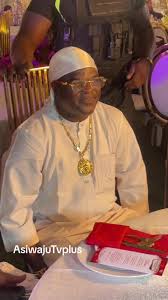Africa
Saeed Ibile, Sahara Reporters, and the Dearth of Responsible Journalism -By Adewale Samson
Saeed Ibile’s experience serves as a harsh reminder of how far unethical media platforms can go when they don’t get their way. But this isn’t just about him. If a successful businessman and philanthropist can be targeted in this manner, then anyone can. This is why it’s crucial for the public to be cautious and discerning. Not every headline tells the truth, and not every media outlet deserves our trust.

Journalism is supposed to be about the truth. It is meant to inform the public, hold leaders accountable, and shine a light on wrongdoing. But when media platforms use their power to spread falsehoods and settle personal scores, they damage the very essence of journalism. This is the unfortunate reality in the case of Sahara Reporters’ ongoing attacks on Saeed Ibile, a respected real estate businessman and philanthropist.
Saeed Ibile has worked hard to build a name for himself in the competitive real estate sector. Beyond his business success, he has also contributed significantly to society through various charitable efforts. Despite his achievements, Sahara Reporters has repeatedly dragged his name through the mud, calling him unprintable names and labeling him a “land grabber” without evidence.
The root of these malicious reports is no secret. Saeed and the owner of Sahara Reporters were once on good terms. Their relationship was mutually beneficial until Saeed decided to stop the financial support and other benefits that had been flowing in that direction. Almost immediately, the attacks began. It’s a classic case of blackmail — using journalism as a weapon to destroy a person’s reputation.
The most recent incident shows just how low Sahara Reporters is willing to go. Following a brutal assassination attempt on Saeed Ibile by personnel of the Nigerian Navy, a picture of him with a bandaged leg circulated online. Rather than reporting the facts or questioning why such a violent attack occurred, Sahara Reporters chose to mock his pain. They used the image to further their smear campaign, ignoring the real story — a man who narrowly escaped death.
Is this what responsible journalism looks like? True journalism involves investigating the facts, presenting balanced views, and allowing the truth to speak for itself. It is not a platform for personal vendettas or paid attacks. When media houses prioritize sensationalism over facts, they betray the trust of their readers and damage the reputation of the entire profession.
Saeed Ibile’s experience serves as a harsh reminder of how far unethical media platforms can go when they don’t get their way. But this isn’t just about him. If a successful businessman and philanthropist can be targeted in this manner, then anyone can. This is why it’s crucial for the public to be cautious and discerning. Not every headline tells the truth, and not every media outlet deserves our trust.
Media regulators also have a role to play. Platforms that engage in blackmail and character assassination must be held accountable. Freedom of the press is essential, but it comes with the responsibility of upholding truth and fairness. When that responsibility is ignored, the damage can be irreversible.
Saeed Ibile’s contributions to society cannot be erased by baseless accusations. His resilience in the face of these attacks is admirable. However, the question remains — how many more people will have to endure this kind of media harassment before something is done?
Responsible journalism is not a privilege; it is a duty. It is time for the media to return to its core values — truth, fairness, and integrity. Only then can we restore the public’s trust and protect the dignity of those who contribute positively to society.

























